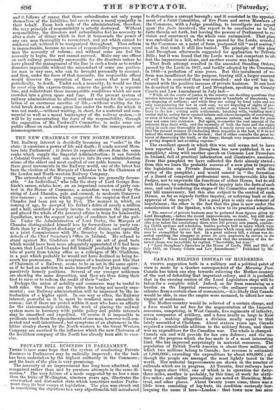THE NEW CHAIRMAN OF '111E NORTH-WESTERN. Tire Railway interest is
decidedly becoming an "order" in the state : it exercises a power of life and death ; it sends several Mem- bers into Parliament • it draws its superior officers from the same ranks which supply the Imperial Administration; it can furnish a Colonial Governor, and can receive into its own administration scions of the oldest and most exalted of our noble houses. Among these great movements in the Railway world, one of the latest has been the election of the Marquis of Chandos to be the Chairman of the London and North-western Railway Company.
The antecedents of this young nobleman are generally favour- able. "An Individual," who tells the story of Lord George Ben- tinck's career, relates how, on an important occasion of party con- test in the House of Commons, a sensation was created by the rising of Lord Chandos, pale and earnest, to moderate Conserva- tive rancour; a service which suggested the suspicion that Lord Chandos had been put up by Peel. The manner in which, on coming of age, he accepted his father's debts of nearly a million and a half, sacrificed a yearly income to commence the payment, and placed the whole of the parental affairs in train for honourable liquidation, won the respect not only of creditors but of the pub- lie. Under the Administration of Lora Derby, the Marquis of Chandos distinguished himself less by forwardness in party con- flicts than by a diligent discharge of official duties, and especially as a joint Commissioner with Mr. Bromley to inquire into the defects of the Chief Secretary's Office in Ireland. He refused to stand against Mr. Gladstone at Oxford ; an act of good taste which would have been more adequately appreciated if it had been known that Lord Chandos had felt himself precluded by the punc- tilio of party from taking office as a colleague of Mr. Gladstone, in a post which probably he would not have declined as being be- neath his pretensions. His acceptance of a business post like that of Chairman of a Railway, seems to be an act in the same spirit ; as if he had an ambition to make himself useful in plain and com- paratively homely positions. Several of our younger noblemen are showing the same disposition, and they are thus doing their best to raise or to redeem the credit of their "order,"
Perhaps the union of nobility and commerce may be useful to both sides. Our Peers are the better for being not merely orna- mental; our Railway administration will be improved by the in- troduction of a higher spirit. In one way or other, the Railway interest, powerful as it is, must be rendered more amenable to reason ; but if there are posted within it men who have an affinity for the statesmanship outside, the work of placing the railway system more in harmony with public policy and public interests may be smoothed and expedited. Of course it is impossible to predicate much from the appointment of one man, however well-con- nected and well-intentioned ; but symptoms of an abatement in the bitter rivalry shown by the North-western to the Great Western Company are ascribed to the influence which the new Chairman of the leviathan company of the North has already been able to exer- cise.


























 Previous page
Previous page